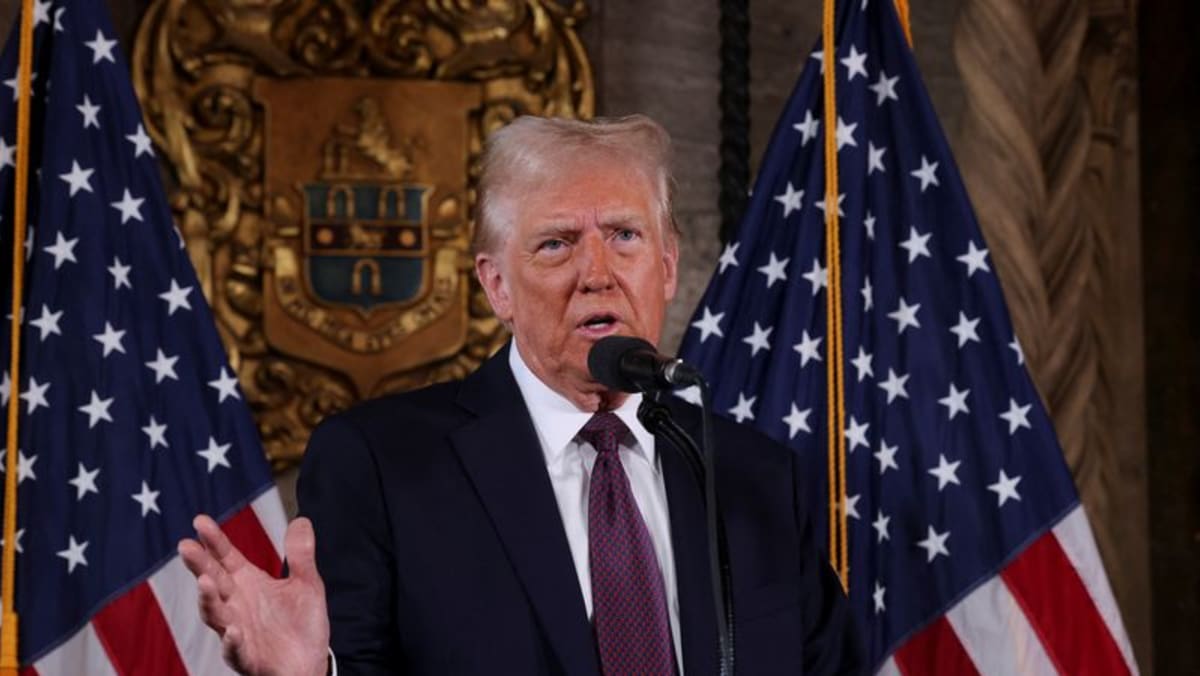Economic discontent, issue divisions add up to tight presidential contest: POLL

Dreary economic attitudes and sharply divergent views on social policies mark the 2024 presidential election, contributing to a tighter contest between Vice President Kamala Harris and former President Donald Trump: Just 2 percentage points now divide them in a new ABC News/Ipsos poll.
Harris has 50% support to Trump’s 48% among likely voters in the national survey, with a similar 49-47% result among all registered voters. (Among all adults, regardless of registration status, it’s a single-point race, 49-48%, excluding those who wouldn’t vote.)
Republican presidential nominee former President Donald Trump, left, and Democratic presidential nominee Vice President Kamala Harris during an ABC News presidential debate at the National Constitution Center, Sept. 10, 2024, in Philadelphia.
Alex Brandon/AP, FILE
The results are slightly closer than Harris’ +5 points among likely voters and the general public, and +4 among registered voters, in the last ABC/Ipsos poll in mid-September. A gain for Trump among men — he’s now +8 points among those registered to vote — is a factor, as is a slip for Harris among independents, often swing voters.

Economy and Vote Preference
ABC News, Ipsos poll
See PDF for full results.
Beneath the horse race, issues pull in opposite directions. The poll, produced for ABC News by Langer Research Associates, with fieldwork by Ipsos, finds that 56% of Americans now favor deporting all undocumented immigrants, up 20 points from eight years ago. That reinforces one of Trump’s strongest issues, with a 10-point Trump lead in trust to handle immigration at the southern border.

Deportation and Abortion: Divergent Views
ABC News, Ipsos poll
Yet the same share, 56%, side with Harris on abortion, saying the federal government should restore access to what it was before the Supreme Court eliminated the constitutional right to abortion in 2022. Many fewer, 41%, favor Trump’s view that each state should decide. It follows that abortion is Harris’ best issue in this poll, with a 15-point lead over Trump in trust on it.
The economy/the future
Then there’s the economy, and related to it, a sharp division on the nation’s future. As reported Friday, 44% of Americans say they’re not as well off now as they were when Biden took office, tying the most negative number on this question in data since 1986.
Further, while inflation has eased and employment is strong, those gains haven’t hit home for most people: 59% say the economy is getting worse, more than twice as many as say it’s getting better, 23%. And among registered voters who say the economy’s worsening, Trump leads Harris by a sweeping 53 points, 74-21%.

Optimism and Vote Preference. Among registered voters
ABC News, Ipsos poll
Largely informed by economic attitudes, registered voters divide, 51-47%, on whether America’s best days are still ahead, or behind it. This in turn relates to candidate choice: Trump, with his message of national decay, leads Harris by 27 points, 61-34%, among those who say the country’s best days are behind it. Harris, with her more optimistic messaging, leads Trump by 28 points, 63-35%, among those who think America’s best days are ahead.
Taken another way, 59% of Trump’s supporters say the country’s best days are behind it. Among Harris supporters, 67% say the country’s best days are still to come.
Economy/issues
Trump leads Harris by 8 points overall in trust to handle the economy and 7 points on inflation, consistent results since August that are central to his competitiveness and reflect Harris’ challenges breaking free from dissatisfaction with Biden’s economic stewardship. (See more on this in Friday’s report on Harris’ headwinds as an agent of change.)
That said, Harris pushes back on another economic benchmark, “looking out for the middle class.” A new item in this poll, she leads Trump on it by 5 points, 42-37%. (The rest don’t trust either of them to handle it.)

Trust on Economic Issues
ABC News, Ipsos poll
A test of three economic proposals from each candidate fills out the story: Trump has both the most popular and the least popular proposals, with Harris winning the second, third and fourth slots of the six.
Specifically, Trump’s suggestion to end income taxes on Social Security benefits leads in popularity, followed by three from Harris — a tax credit for middle- and lower-income families with newborns, a limit on the profits food companies can make on groceries and grants to first-time home buyers. Two more Trump proposals come next — raising tariffs on foreign imports, and the one that is unpopular among most people, cutting corporate income taxes.

Republican presidential nominee and former President Donald Trump addresses the Detroit Economic Club in Detroit., Oct. 10, 2024.
Rebecca Cook/Reuters, FILE
One of these — the idea to end taxes on Social Security benefits — rises to the level of majority “strong” support, 55%. Harris’ three proposals also get more strong support than strong opposition, by 10 to 23 points. Trump’s remaining items, by contrast, get much less strong support — and cutting corporate income taxes is more apt to be strongly opposed.

Views on the Candidates’ Economic Proposals
ABC News, Ipsos poll
In trust on other issues, Trump holds single-digit leads on handling crime and safety, national security and the conflict in the Middle East; Harris has a single-digit lead on “protecting American democracy.” Results for items repeated from past polls are virtually unchanged.
Enthusiasm and attributes
While potential voters are closely divided on many points, enthusiasm and personal favorability are two areas in which Harris has clear advantages. Among registered voters who support her, 84% say they’re enthusiastic about it; among Trump supporters, enthusiasm drops by 6 points, to 78%. That’s markedly lower than enthusiasm for Trump — 93% — at this point in 2020.

Democratic presidential nominee, Vice President Kamala Harris speaks during a campaign rally at the Rawhide Event Center, Oct. 10, 2024, in Chandler, Ariz.
Brandon Bell/Getty Images
Enthusiasm is related to personal favorability, and 44% of Americans see Harris favorably, vs. 35% for Trump. Harris’ favorability rating lost 3 points in this poll, and 47% now see her unfavorably. That said, many more, 58%, have an unfavorable opinion of Trump.
Favorability isn’t determinative. Trump has been underwater in favorability consistently since 2015 — but won the Electoral College eight years ago regardless.
One important boost to Trump is that, among the 15% of registered voters who see both candidates unfavorably, he leads by a wide margin, 62-24%. Looking at it another way, 21% of Trump’s supporters see him unfavorably, but support him anyway. The corresponding figure for Harris is just 7%.
Trump also continues to score a few points by portraying Harris as too liberal. Forty-eight percent of Americans see her this way, vs. 43% who call Trump too conservative. That said, 7% call Harris too conservative and 9% call Trump too liberal; at the end of the day, very similar numbers call them “about right” ideologically, 43% for Trump, 41% for Harris.
Debate?
However much they’re liked or disliked, another result shows that most people are ready to hear more from the candidates: 57% say Harris and Trump should agree to an additional televised debate, while 41% say not.
Trump reiterated last week that another debate is not in the cards. And there’s a difference on the question between their supporters. Among registered voters who prefer Harris, 71% are looking for another debate, while among those who prefer Trump, this drops sharply, to 45%. (After their sole debate last month, 58% overall thought Harris had won it.)
Partisans
With the election close to three weeks away, partisanship infuses survey results. Eighty-five percent of Republicans and Republican-leaning independents say the economy is getting worse, for instance, while just 32% of Democrats and Democratic leaners agree. In another example, Republicans and GOP leaners are far more apt than their Democratic counterparts to say the country’s best days have passed, 60% vs. 36%.
Policy preferences show similar patterns. Eighty-eight percent of Republicans support mass deportation, as do 58% of independents, compared with 26% of Democrats. (That said, support for deportations has increased broadly compared with a 2016 survey, with the exception of views among Democrats and liberals.)
On abortion, partisan divisions results are reversed: Eighty-seven percent of Democrats say the federal government should restore abortion access, as do 57% of independents, dropping to 27% of Republicans.

Partisanship and the Issues
ABC News, Ipsos poll
Vote preferences
Polls are best used not to recite who’s ahead, but to assess how and why the country is coming to its decision. It’s also important to keep in mind that the ultimate winner of the popular vote may differ from the winner of the presidency, as demonstrated in 2016 and 2000 (and likewise, for history buffs, in 1888, 1876 and 1824).
With Election Day drawing close and early voting underway, this poll includes slight departures from previous ABC/Ipsos polls this cycle in measuring vote preferences. Survey respondents are offered up to five candidates — Harris, Trump, Jill Stein, Chase Oliver and Cornel West, and their running mates — based on which of those candidates are on the ballot in the state where the respondent lives. (Robert F. Kennedy Jr., while on the ballot in 30 states and the District of Columbia, is not listed, since he’s not actively running. Respondents can volunteer their support for Kennedy or anyone else.)
In addition to being asked whom they’d support, respondents are given the option of saying they already voted. In this survey 1% had done so, a number likely to ramp up quickly.
As mentioned, one shift in this poll is the result among men who are registered to vote — 52-44% in Trump’s favor, compared with a dead heat, 48-48%, in mid-September. That includes a 19-point Trump lead among white men and a close contest among Hispanic men and younger men (age 18-39) alike.
A slight change is among independents, who, per exit polls, have voted for the winner in nine out of the last 12 presidential elections. Harris led among independents by 10 points, 51-41%, in mid-September, compared with a non-significant 5 points now, 49-44%.

Vote Preference by Group
ABC News, Ipsos poll
Harris, for her part, continues to lead among women by 9 points, 53-44%, aided by her showing among under-40, Black and Hispanic women. And she leads by 14 points among college graduates, 56-42%, among the more reliable groups for turnout.
The 17-point gender gap between the candidates (Trump +8 among men, Harris +9 among women) is back to its typical level; it has averaged 19 points in exit polls since 1996. This reflects the fact that women are 8 points more apt than men to identify as Democrats.
The contest stands at 82-13%, Harris-Trump, among Black people who are registered to vote; that compares with 87-12% in the 2020 exit poll (a slight 5 points lower for Harris; no better for Trump). Black women are at 87-10% now (compared with 90-9% in 2020); Black men are at 76-18% (compared with 79-19% four years ago). These differences from 2020 aren’t statistically significant.
Then there’s the division of votes by state groupings. In what are thought to be safely and likely red states, Trump is comfortably ahead, 55-42%. In expected blue states, Harris is well ahead, 56-39%. And in the seven battleground states where the contest is expected to be close — Arizona, Georgia, Michigan, Nevada, North Carolina, Pennsylvania and Wisconsin — it couldn’t be closer: 49% for Harris, 49% for Trump.
METHODOLOGY – This ABC News/Ipsos poll was conducted online via the probability-based Ipsos KnowledgePanel® Oct. 4-8, 2024, in English and Spanish, among a random national sample of 2,631 adults. Partisan divisions are 29-29-30%, Democrats-Republicans-independents. Results have a margin of sampling error of plus or minus 2 percentage points, including the design effect, for the full sample. Error margins are larger for subgroups. For registered voters, the sample size is 2,226 and the error margin is 2 points. For likely voters, the sample size is 1,714 and the error margin is 2.5 points. Sampling error is not the only cause of differences in polls.
The survey was produced for ABC News by Langer Research Associates, with sampling and data collection by Ipsos. See details on ABC News survey methodology here.
Source: abc news















